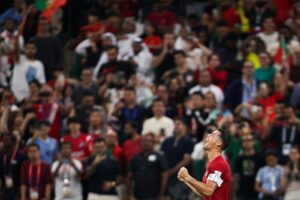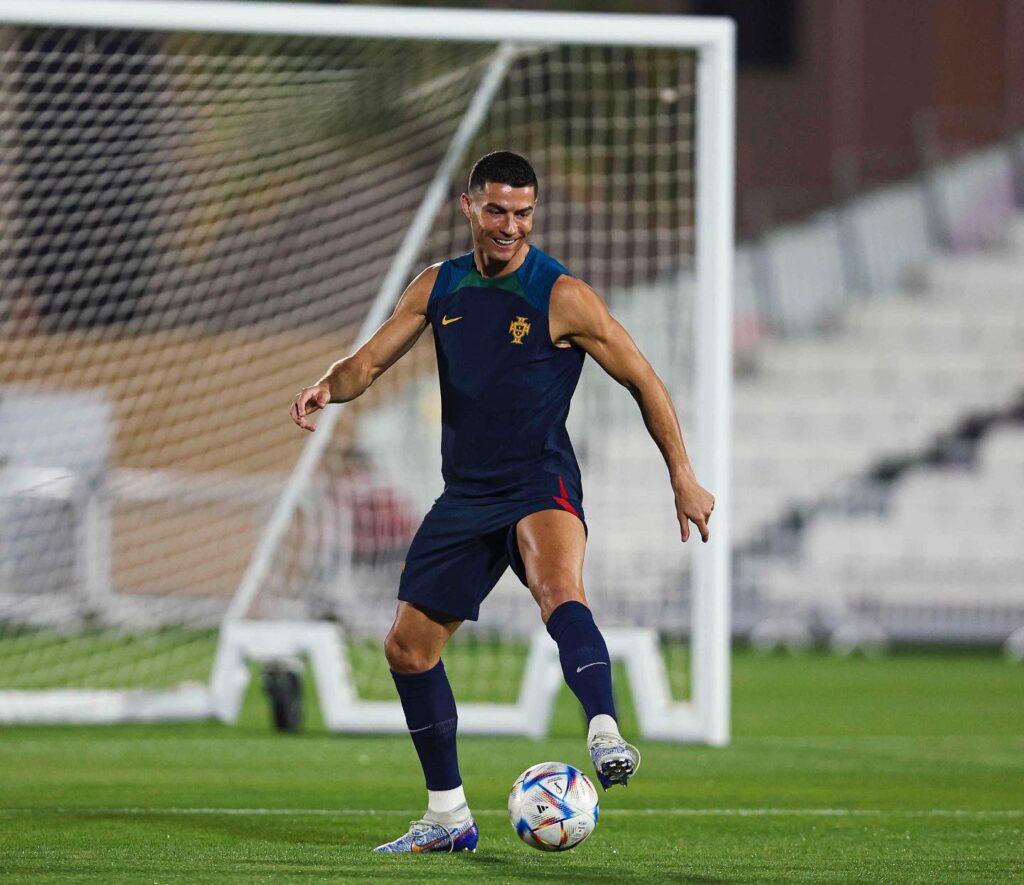Reality Bites for CR7 as Ramos Runs Riot
There were shades of peak Ronaldo in the manner in which the brilliant young Benfica star took his hat-trick, and his partnership with Joao Felix could well decide whether Ronaldo – in a new avatar as super sub – leaves the World Cup stage a winner.
If, at the age of 37, Cristiano Ronaldo does get his hands on the World Cup trophy, it will almost certainly be in his new role as Portugal’s super sub. Unless Goncalo Ramos, the youngest scorer of a World Cup hat-trick since Hungary’s Florian Albert in 1962, gets injured or suspended, it’s safe to say that Ronaldo will not be starting another World Cup game. If he’s to add to his tally of 8 goals on the world stage, they will come from the substitutes’ bench.
To put that into perspective, you have to go back five World Cups and four European Championships to find the last time Ronaldo didn’t start a game where there was something at stake. Portugal 2, Russia 0 was the scoreline that day at Euro 2004. Since then, the only matches he hasn’t started have been dead rubbers, with qualification to the knockout stage already assured.
Here’s a quiz question for you. Of those players with 8 or more World Cup goals, which three have the worst goals per game ratio? Answer: Ronaldo (8 from 21 matches), Diego Maradona (8 from 21) and Lionel Messi (9 from 23). He may have over 800 career goals, including 118 for Portugal, but the World Cup hasn’t been a happy hunting ground for Ronaldo.
Maradona was far more than a goalscorer. He won Argentina a World Cup in 1986, and took an utterly mediocre team to the final four years later. As for Messi, his influence on matches extends far beyond the scoring of goals. If teammates – Lautaro Martinez against Australia offered the latest glaring example – didn’t spurn gilt-edged chances created by Messi, we wouldn’t still be talking about his lack of a World Cup winner’s medal in 2022.
Just to put the 6-1 rout of Switzerland into context, you have to go back to the 2002 World Cup, when they exited at the group stage, for the last time a Portuguese team scored two goals a game or more in a major tournament. When they finished fourth at Ronaldo’s first World Cup in 2006, they scored a dismal seven goals across seven matches.
In 21 games starting from that 2006 tournament, they had scored only 30 goals. It’s no surprise at all then that they hadn’t made it past the last 16 since then. Much is made of Portugal’s Euro 2016 win, also masterminded by Fernando Santos. Victory may be enough for some, but for the neutral, Portugal – along with Greece of 2004 vintage – remain the worst team ever to win a major tournament.*

What was going through Ronaldo’s mind as young Ramos put on a striker’s clinic at the Lusail Stadium? He might have thought briefly of his own career. Going into Euro 2004, Ronaldo had scored just 6 goals in 40 games in his first season with Manchester United. Last season, as understudy to Darwin Nunez at Benfica, Ramos managed only 8 from 46. The coaches and scouts who watched both clearly saw something that went beyond cold numbers.
Maybe he was also thinking of how it’s all unravelled after leaving Madrid. When he left for Juventus and Turin in 2018, it was after a fourth Champions League victory in five seasons. For a Juventus team that had lost the 2015 and 2017 finals, he was meant to be the last piece of the jigsaw.
In his first year there, Juventus won the league by 11 points and went out in the quarterfinals of the Champions League. In year two, they edged Inter Milan to the Serie A title by a point, and exited Europe in the last 16. In 2020-21, they were lucky to sneak into fourth place and Champions League qualification. The Champions League dream had again been extinguished in the second round.
He then returned to a Manchester United side that had finished second to City, and scored 73 goals. He may have topped the scoring charts for United, but they scored just 57 goals and finished way off the pace in sixth. It was increasingly obvious to anyone watching that the rewards didn’t match the risk that went with playing Ronaldo.
He may have the six-pack and the leap of a basketball star, but Ronaldo no longer has the searing pace or mobility to trouble the best defences. He will score goals if a team is set up to cater to his needs, but the skills of many others will be sacrificed in the process. Watching Ramos and, later, AC Milan’s Rafael Leao, tear through the Swiss defence, was to witness something that simply wouldn’t have been possible if Ronaldo was leading the line.
Make no mistake, Ronaldo has been one of the greatest to play the game. But the key phrase here is ‘has been’. The last hat-trick in a World Cup knockout game was way back in 1990, when the imposing figure of Tomas Skuhravy put three headers past the Costa Rican goalkeeper for Czechoslovakia. What Ramos did was nothing like as prosaic.
The thunderous left-footed finish from an impossible angle for his first, and the impudent chip over Yann Sommer for the hat-trick were both wonderful goals, but the real sign of his quality was the second. The great strikers – like Ronaldo in his Real Madrid prime – sniff an opportunity long before the defence becomes aware of the danger.
As soon as Diogo Dalot started to run into the box, Ramos set off towards where he needed to be. By the time the cross arrived at the near post, he was in front of the covering defender and ready to deflect the ball past Sommer. Pure instinct and opportunism, and a thrilling finish reminiscent of Jurgen Klinsmann against the Dutch in a round-of-16 clash at Italia ’90.
Brazil’s evisceration of South Korea was eye-catching, but this dismantling of a Swiss side that have been robust and solid for half a decade was frightening. In some ways, life on the bench could suit Ronaldo as well. Twenty minutes at the end against defences run ragged by Ramos and Joao Felix represent probably his best chance to add to that goal tally. The ego may have taken a bruising, but there’s a World Cup to win. That’s the big picture, and on this evidence, it’s definitely no mirage.
*They didn’t win a single game in the group phase, needed extra time to beat Croatia 1-0, and then edged Poland in a shootout after a 1-1 draw. Ronaldo then scored twice to see off a Wales team that had grossly overperformed to get to the last four. France dominated the final on just about every metric you can think of, only for Eder’s wonder goal to clinch the trophy.
The depressingly bland football played by Greece and Portugal becomes all the more unpalatable when compared to the brilliance that Spain served up in between. On a different plane in 2008, they weren’t quite as sharp in 2012, but still good enough to rout Italy 4-0 in the final.




